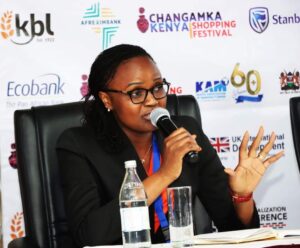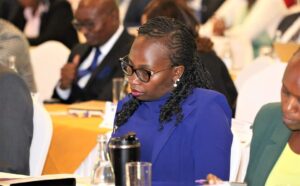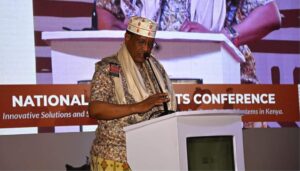Private Sector Joins Other Stakeholders and Developmental Partners to Explore Available Work Opportunities

The Kenya Private Sector Alliance (KEPSA) through its ongoing programs, the Ajira Digital Program and the Sustainable Inclusive Business – Kenya, today hosted a roundtable for key stakeholders in the green economy to discuss the emerging solutions for businesses as well as the work opportunities for young people in the green sector while curbing issues of climate change.
The roundtable comes a day before the International Youth Day Celebrations, whose theme for this year is “Green Skills for Youth: Towards a Sustainable World” highlighting the shift towards an environmentally sustainable and climate-friendly world to help respond to the global climate crisis and the pressing youth unemployment challenge but also for achieving the Sustainable Development Goals.
The discussion at the roundtable focused more on the possible work opportunities in the green economy both in the formal employment and creation of enterprises by young people in Kenya.
“The Government recognizes that the interplay between economic growth, environmental sustainability, and job creation is a delicate balance that requires innovative strategies and robust partnerships,” said Mr. Ismail Maalim, the Permanent Secretary at the State Department of Youth Affairs in the Ministry of Youth Affairs, Sports and Arts, in a speech read by Dr. Cornelius Ombagi, Director of Youth Innovation and Talent Development at the State Department of Youth Affairs.
The roundtable was well attended by key stakeholders in the green economy including government and policymakers, private sector organizations, young people participating in green jobs and green businesses, representatives from the TVET authorities as well as UN representatives and other developmental partners.
Maalim explained that the Government had made notable efforts in regard to the growth of the green economy including policies incentivizing green innovations, sustainable production methods, and the adoption of eco-friendly technologies. He explained that by doing so, the government is not only mitigating environmental degradation but also opening avenues for the creation of green jobs.
Some of the policy frameworks enacted by the government of Kenya to promote the green economy and encourage youth involvement are Kenya National Climate Change Action Plan (KNCCAP), Kenya Green Economy Strategy and Implementation Plan (GESIP) 2016-2030, Kenya National Biodiversity Strategy and Action Plan (NBSAP) 2016-2020:National Environment Management Authority (NEMA) Regulations, Kenya Forest Service Strategic Plan,
Kenya Industrial Transformation Program, National Youth Policy (NYP) 2019, Kenya Vision 2030 among others.
“The reason our young people are not accessing work opportunities in the green economy is that as a nation we have for a long time focused on cleaning the environment instead of managing the environment. For instance, if a mother trashes a waste diaper in a river, the solution should not be to just collect that diaper but instead, return it to the manufacturer to design proper strategies for environmental management.
This is referred to as an extended producer responsibility. What this means is a sustainable department or resource in these organizations.
On the enterprise end, this would mean establishing waste collection shops as well as innovations in waste management solutions. It could mean small factories for the same.
All these are job opportunities for young people in Kenya” said Dr. Ayub Macharia, Director of Environmental Enforcement at NEMA.
Speaking at the roundtable was also Dr. Ehud Gachugu, Director Ajira Digital Program and Youth Employment at KEPSA, where he highlighted the potential that the twin transition exhibits by integrating digital with green economy.
The global green economy is estimated to be worth over $4 trillion and is expected to grow even further as environmental concerns gain prominence on the global stage. On the other hand, the digital economy’s contribution to Kenya’s GDP has been steadily increasing, reaching approximately 7% in recent years, and is expected to grow to 9.24% by 2025.
He, therefore, called upon all actors to join hands in beyond dialogue and move to action and implementation, whether in policy or in projects that create and promote green jobs.
Sharing her experience as a sustainability professional, now heading the sustainability department in BioFoods, Rosalid Rwaru, urged young people to get out of their comfort zone and upskill and reskill in green skills to expand their opportunities. She called out to the youth to interact and learn more about the policies and documents existing around sustainability as well as be innovative to take advantage of available opportunities. She emphasized the need to understand the job market and the future of work.
Speaking at the roundtable, Dr. John Wandaka, vice chairperson, of the KEPSA environment, water, and natural resources sector board, expounds on the role of the private sector in the growth of the green economy and green jobs by driving trade and investment in green goods and services. Dr. Wandaka said that trading in environmental goods and services allows foreign direct investment, spurs Public-Private Partnerships, drives sustainable trade agreements, and provides financial resources for climate-related interventions.
In Africa, climate change presents a US $ 3 trillion investment opportunity for the continent, and as committed in the Paris Agreement, 75% of the investment is expected to come from the private sector, complementing the public sector financing. On the other hand, these green investments have the potential to offer high returns to investors.
Dr. Wandaka added that these opportunities are reinforced by Africa’s advantages which include the young workforce where 70% of Sub-Saharan Africa is under the age of 30. He demonstrated that the green economy is a solution to the current youth unemployment issues with the growing number of unemployed Kenyans today being close to 3 million while every year approximately one million graduates join the labor market. He added that the private sector has a major role to play in the growth of the green economy and green jobs.
In addressing the outcomes of the roundtable discussion, Ebenezer Amadi, Program Manager of Sustainable Inclusive Business – Kenya, emphasized the significance of fostering collaboration across multiple stakeholders, spanning from government entities to private sector representatives and young individuals.
Amadi highlighted that a promising avenue for youth engagement has emerged within government procurement, underscored by AGPO’s 2023 data, which demonstrates that youth have effectively captured 39% of these opportunities.
Notwithstanding these promising developments, it is evident that these opportunities may currently appear distant for young individuals.
The initial stride involves bolstering awareness and comprehension among youth regarding the intricacies of the application process and the essential proficiencies requisite for the prosperous execution of such opportunities.
It is with this backdrop that he also recognized the vast potential within waste management, regenerative agriculture, and the embrace of circularity principles.
Case in point, the solar sector holds significant promise, with a potential value of 330 million USD, and households contributing 63 million USD to this estimate. Globally, the market is projected to expand substantially, reaching a staggering 373 billion USD by 2029.
The transition to green jobs requires collective commitment and holistic action as it is a viable solution to reducing unemployment in Kenya. Green jobs can drive economic growth by fostering innovation, investment, and market expansion in renewable energy, sustainable agriculture, clean technology, and more. On the other hand, businesses in the green sector offer opportunities for long-term employment and contribute to economic resilience by reducing dependence on finite resources and volatile markets. The roundtable was a great start as the stakeholders collaborate beyond dialogue and move to action and implementation.
About Ajira Digital Program and Partners: Ajira Digital Program is an initiative of the Government of Kenya under the Ministry of ICT and Digital Economy with strategic partnership of Mastercard Foundation and is being implemented by eMobilis Technology Training Institute (eMobilis) and Kenya Private Sector Alliance
(KEPSA).
Mastercard Foundation under the Young Africa Works strategy is the program’s principal investment partner.
The program’s mission is to enable one million young women and men to access digital and digitally-enabled jobs annually through accelerating digital outsourcing; digitization of processes and services within the private and public sectors to position Kenya as a choice labour destination for multinational companies and a top-rated global freelancing hub.
The Ajira Digital program aims at providing an end-to-end solution for young people to work and earn online. eMobilis is charged with the operationalization of Ajira Youth Empowerment Centers, the institutionalization of Ajira Clubs in Universities, and Technical & Vocational Educational Trainings (TVETs) as well as the implementation of training and mentorship across the country. On the other hand, KEPSA supports catalyzing digitization for the private sector and e-government to create demand for the digital and digitally-enabled work skills offered by the program. The Government of Kenya through the Ministry of ICT & Digital Economy, Mastercard Foundation, eMobilis, and KEPSA work in close cohesion towards realizing the goal of the program as it addresses unemployment for young Kenya while contributing to the growth of the digital economy.
Ajira Digital is a free program open to all young Kenyans who are looking to make a dignified livelihood from digital and digitally-enabled work opportunities. Just by a single click on www.ajiradigital.go.ke one is able to access free training, mentorship, and online work linkages to enable them to work and earn a decent income.
About Sustainable Inclusive Business
Sustainable Inclusive Business – Kenya (SIB-K) is a knowledge centre under the Kenya Private Sector Alliance (KEPSA) established with funding from the Netherlands Government. The programme encourages businesses to be sustainable and inclusive, positively impacting People, Planet, and Profit. This is achieved through sharing information on best practices and viable, sustainable business models, implementing sustainable business policies, and creating partnerships. SIB-K is also the lead organization implementing the Kenya Plastics Pact. This ambitious, collaborative initiative brings stakeholders across the whole plastics value chain to transform the current linear plastics system into a circular economy for plastics. All stakeholders sign up for a joint set of ambitious and time-bound targets, ensuring this collaboration will drive significant change by 2030.





